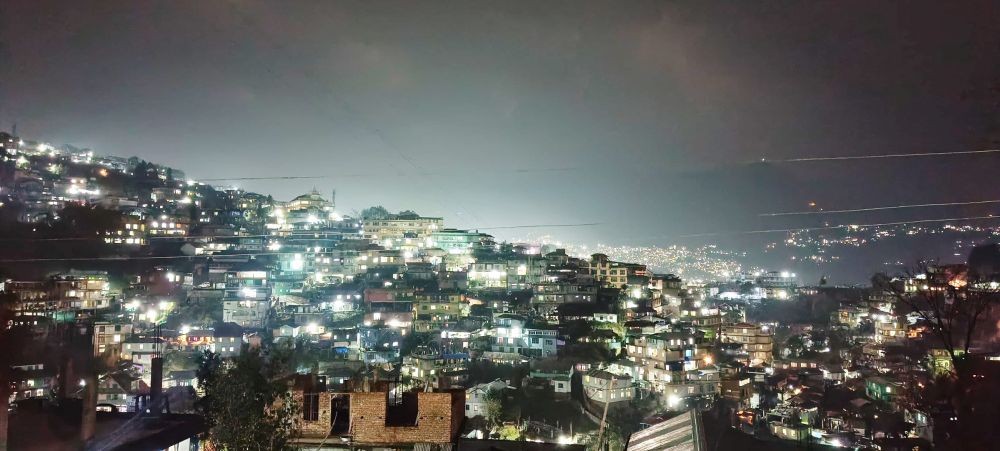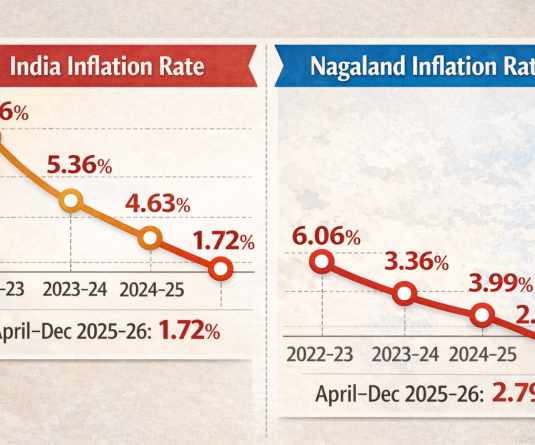Capital Kohima seen fully illuminated during the designated Earth Hour on March 23 evening. (Morung Photo)

‘Young people have role to play in safeguarding environment, says environment enthusiasts
Vishü Rita Krocha
Kohima | March 23
Nagaland witnesses a conspicuous absence of Earth Hour observance this year, with the State Government notably silent on the matter. While neighbouring states engaged in the symbolic act of turning off lights for one hour to mark Earth Hour, Nagaland remained devoid of any official notification or initiative urging citizens to participate.
Earth Hour is a worldwide movement organized by the World Wildlife Fund to encourage people to raise awareness about climate change and promote energy conservation by asking people to switch off lights at homes and businesses for an hour from 8.30 to 9:30 pm. Earth Hour this year was observed on March 23.
In capital Kohima, lights remained brightly illuminated as citizens kept their lights fully on during the designated earth hour period. Similar ‘bright lights’ scenario was also reported in most of the districts including Dimapur.
Despite the absence of Earth Hour observance this year, citizens echoed sentiments emphasizing the importance of collective action while advocating for positive change to show commitment to environmental stewardship.
"Young people have a huge role to play in safeguarding the health of the planet and their immediate environment. They have the responsibility to demand and also strive for a healthy planet as they and the generations after them are the future victims of impending climate catastrophes."
These are thoughts that Dr Robert Mizo put across even as millions of people across the globe observed Earth Hour on Saturday evening. In an interview with The Morung Express, Dr. Mizo also cited ways through which citizens can contribute to the cause of environmental conservation by adopting and living an eco-friendly lifestyle.
One of the ways, he cited is "through a conscious engagement with our environment in the way we extract, produce, and consume." He also underlined how one can reduce "the impact of consumption on the environment through sustainable traditional methods and knowledge" and also "by holding political leaders accountable to ensure clean and healthy environment through/by an educated citizenry."
Mention may be made here that Dr. Robert Mizo who grew up in Nagaland currently serves as an Assistant Professor of Political Science and International Relations at the Department of Political Science, University of Delhi. He holds a PhD in Climate Policy studies and his research interests include Climate Change and Security, Climate Politics, Environmental Security, and International Environmental Politics.
'Earth Hour, a very significant activity for advanced countries'
For environment enthusiast, Agnes Tepa, "observing Earth Hour is a very significant activity that will make a difference in advanced countries where there is hardly ever any power cuts."
However, in places like Nagaland, she pointed out: "Don’t we have more than one hour of power cuts almost every day?" In this context, she went on to say, "Developed countries should do much more to save the planet earth" while articulating that, "after all, they are supposed to be having the lion’s share of causing pollution on earth."
She also underscored that, "uniting for our one shared home for an hour is not good enough, if no further steps are going to be taken to take care of our planet earth." Mention may be made here that this year's theme for Earth Hour is "Uniting for Our One Shared Home."
As a Christian state, Agnes Tepa also advocated that "it is our responsibility and privilege as Christians to judiciously use the earth’s natural resources and to take good care of our environment."





